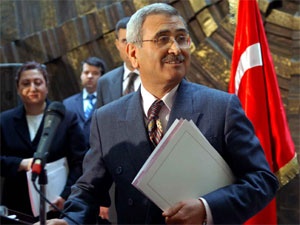
'If there are 'gaps in the budget -- and apparently there are -- we expect measures to be taken so that the year-end forecasts are achieved', the governor of the central bank Durmus Yilmaz told a press conference here.
The measures should be taken 'without delay', he said.
Turkey's budget showed a deficit in June and notably lower primary surplus data compared with a year earlier, in what, experts say, indicates increased public spending in the run-up to last weekend's early legislative elections.
The ruling Justice and Development Party (AKP), credited for stabilising the fragile economy and securing strong growth since it came to power in November 2002, won a resounding victory in the election and pledged to pursue economic reform.
The government last year failed to achieve its inflation target of 5.0 pct, with consumer prices increasing by 9.65 pct.
Fighting inflation is a key element in Turkey's three-year stand-by programme with the International Monetary Fund, which is backed by a 10 bln usd loan.
The programme had helped the government drastically to reduce inflation -- from 29.7 pct in 2002 to 7.7 pct in 2005.
Ankara has yet to say how its relations with the IMF will proceed after the stand-by deal expires in May 2008.
Durmus said Turkey would not need a fresh loan from the IMF, but raised questions on whether Ankara would have the political resolve to stick to fiscal disipline without IMF monitoring.
'The IMF has been an important anchor... The question now is: can we continue to make the decisions that we have made with the IMF without the IMF? If we can do that, there will be no problem,' he said.
'My personal opinion is that in the coming term certain fiscal discipline rules should be determined, announced to the public and implemented -- with or without the IMF,' he added.
The business community and financial markets have welcomed AKP's re-election in the hope that another five-year term for the business-friendly party would consolidate economic stability.
Under the AKP, growth averaged 7.0 pct between 2003 and 2006, direct foreign investment, stagnating at an average of 1.1 bln usd in the decade to 2002, hit 20 bln usd last year alone and public debt dropped from 78 pct of GNP in 2002 to 45 pct in 2006.














